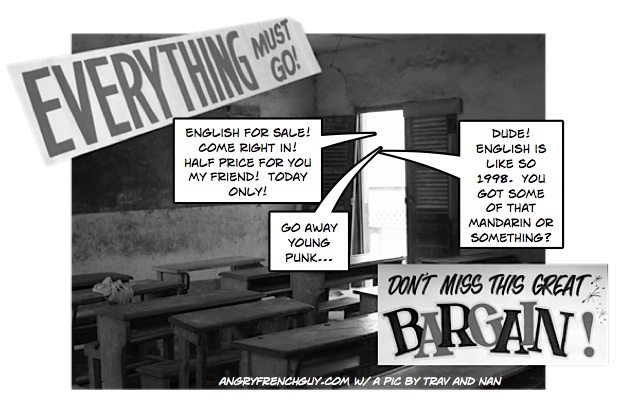Is the English Language Bubble About to Burst?

The British Prime Minister was in China and India last week and in stark contrast with other world leaders who have been in a rather gloomy mood lately, warning us of hard times, deficits and sacrifices, Gordon Brown was in Asia to give out gifts like a pale yet jolly English Santa. One gift, I should say.
The gift of English.
« In total, 2 billion people worldwide will be learning English by 2020. But there are millions more on every continent who are still denied the chance to learn English », said the Prime Minister. « So today I want Britain to make a new gift to the world: a commitment to help anyone – however impoverished and however far away – to access the tools they need to learn English. »
You know times are rough when people start giving away their product.
Because the English language is a product. It is a commodity that is bought and sold on the world markets. In 2005, back when he was chancellor of the exchequer, Gordon Brown himself said that English was the UK’s biggest foreign currency earner. The value of English to Britain’s economy was second only to North Sea oil, according to the British Council.
English language teaching in the strictest sense is a lucrative service industry, with annual global revenues of billions of dollars a year. International education exports like textbooks – twenty-five percent of books sold in China are English learning-related! – and international students who come to study in British universities are worth over 28 billion pounds a year to the British economy.
But that doesn’t even come close to giving you an idea of the value of the English language for Britain and other English-speaking countries.
English on its own is useless, like Microsoft Windows on a computer that doesn’t have any other software. The real value of English is that it is an essential technology for workers and countries that want to access globalized commerce networks and western science. It’s a platform. And just like when you choose a Mac over a PC or the Xbox over the Wii, your choice is a commitment to continue buying other related products and technology built on the English language platform.
When people adopt the English platform they are also adopting English education, English books and magazines, English engineering and English technology.
The 1990’s and the 00’s was a moment of unprecedented profitability for anything related to the English language. « Nearly a third of the world population will all be trying to learn English at the same time », observed linguist David Graddol in a report to the British Council on the state of English in 2006. « These children belong to a moment in world history – unprecedented and probably unrepeatable – at which students throughout formal education – from early primary school, secondary school, and students in college and university – are all learning English at beginner or intermediate level. »
« Unprecedented and unrepeatable ». « A moment in world history. » A bubble?
English, like oil and bandwidth, is inextricable from global commerce and trade. The demand for English and the price people are willing to pay for it rises with the volume of trade in the globalized market. When the market breaks down, as it just did, demand for all the lubricants of global trade – oil, capital, English – drops, and the value of those commodities fall.
But in the case of English, the market broke down just as it was being flooded with new discount providers like the Philippines and Singapore. Everyone was trying to get a piece of the English boom. The United Arab Emirates alone opened at least five English language universities in the last decade. Even France offers English-only programs in its universities, merde!
A market with no room for growth, saturated with way to much capacity is hit by a sharp and sudden drop in demand.
Pop goes the bubble?
Is a near universal skill still valuable? How about when hundreds of millions people across Europe and Asia who have spent considerable time and money to learn English find themselves unemployed?
English is probably too deeply entrenched in the mechanisms of commerce and science to completely lose it’s position as the global language. But during the last few decades just about every country in the world built up its ability to teach itself English through it’s public school system. There is no longer the absolute necessity to purchase English on the private market.
So how do you keep your market share when your product is no longer competitive? You give it away and flood the market.
That’s exactly what Gordon Brown did last week.